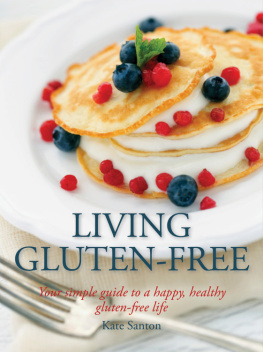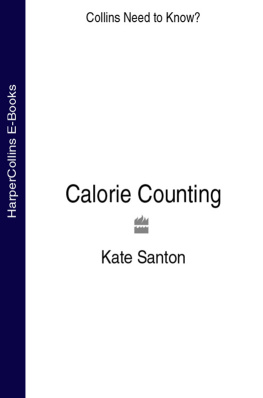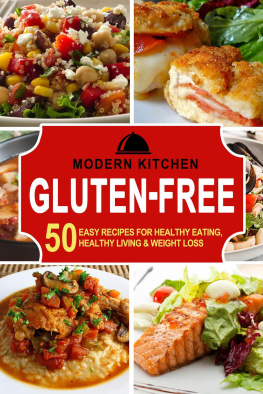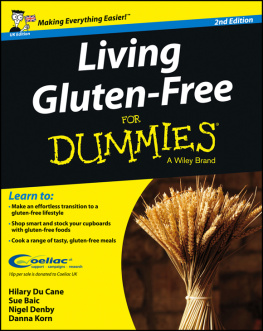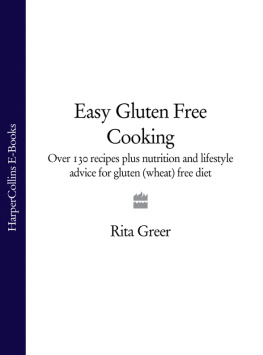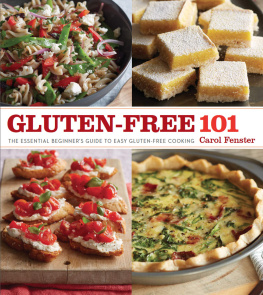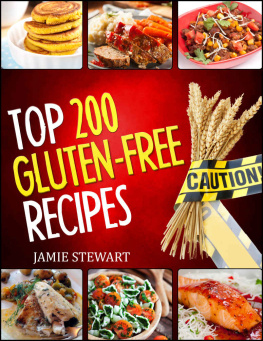LIVING GLUTEN-FREE
Your simple guide to a happy, healthy gluten-free life
Infinite Ideas
Copyright information
Copyright Infinite Ideas Limited, 2013
First published in 2013 by
Infinite Ideas Limited
36 St Giles
Oxford
OX1 3LD
United Kingdom
www.infideas.com
All rights reserved. Except for the quotation of small passages for the purposes of criticism or review, no part of this publication may be reproduced, stored in a retrieval system or transmitted in any form or by any means, electronic, mechanical, photocopying, recording, scanning or otherwise, except under the terms of the Copyright, Designs and Patents Act 1988 or under the terms of a licence issued by the Copyright Licensing Agency Ltd, 90 Tottenham Court Road, London W1T 4LP, UK, without the permission in writing of the publisher. Requests to the publisher should be addressed to the Permissions Department, Infinite Ideas Limited, 36 St Giles, Oxford, OX1 3LD, UK, or faxed to +44 (0) 1865 514777.
A CIP catalogue record for this book is available from the British Library
ISBN 9781908474476
Brand and product names are trademarks or registered trademarks of their respective owners.
Most people who need to follow a gluten-free diet do so because they have been diagnosed with coeliac disease. This is a serious disease, and you should not attempt to self-diagnose or treat it or any other long-term, potentially serious conditions without taking medical advice. This book is not a replacement for that advice, nor for treatment from a qualified medical professional, and neither the publisher nor the author can accept any responsibility for anyone who follows a specific dietary regime when it isnt strictly necessary.
Introduction
There are good reasons for thinking about changing to a gluten-free diet, but fashion isnt one of them. You shouldnt cut gluten on a whim, even if you have unpleasant symptoms which seem to be associated with eating bread, cakes, pasta, pastries and a GF diet should never be undertaken casually. Its not a flash in the pan, a trendy fix for undiagnosed problems; its a therapeutic diet for some specific conditions, and the main one is coeliac disease. So if youre thinking about going gluten free because youve been feeling generally unwell and wonder if gluten could be the problem, see your doctor and talk it through. Those symptoms youve been experiencing could be the signs of coeliac disease, and that needs to be confirmed. Or not, of course.
If you are one of the increasing number of people who have coeliac disease, a gluten-free diet is essential. For you, being gluten free isnt the same as being on a diet: it isnt optional. Its vital. Its a whole lifestyle change, and one which is absolutely necessary. It isnt easy but it can become second nature and, when it comes down to it, you dont have to miss out on anything you really love or enjoy; there is a wealth of naturally gluten-free food and drink out there, as well as an ever-increasing range of alternative foods. The health benefits will transform your life, because coeliac disease is thoroughly treatable with dietary changes: you just need to cut out anything with gluten in it. And you can be really well in fact, you will be, once you are properly diagnosed and eating a gluten-free diet. Take the tennis star Novak Djokovic, who was eventually diagnosed with coeliac disease after years of discomfort. He credited his diagnosis, the dietary changes he had to make and the resulting improvement in his health with the marked improvement in his game in 2011.
But its important to understand what coeliac disease is not: its not an allergy. Its an autoimmune disease, one which is permanent and chronic, and it should always be taken seriously. It mainly affects the gut, and the cause is an inflammatory reaction to gluten. Its genetic so you were born with a predisposition to develop it, though its perfectly possible that you may not have felt any effects for some time.
If youve been recently diagnosed, you probably feel that life will never be the same again. However, there are many reasons to be more cheerful than that. There is a lot of sensible support out there, and organizations like Coeliac UK and Celiac Disease Foundation are resources that should definitely be used. They will make your life so much easier and as an added benefit will help you understand that you really are not alone however much you may feel isolated, especially in the early stages. Another reason to be optimistic is that your disease can be treated effectively with those dietary changes: you dont need to take tablets every day or inject yourself with drugs. The diet you do need to follow will bring a great change for the better, and following a gluten-free diet doesnt have to be penitential. In fact, many people find that they end up eating much more healthily when they go gluten free because they are no longer eating a lot of overprocessed food. Finally, when youre on a gluten-free diet you dont have to eat tasteless, boring meals and you really dont have to spend a fortune in the special diets section of the supermarket. You can still enjoy eating with the considerable plus of feeling and being well.
What is coeliac disease?
Coeliac disease is extremely common: there have been estimates that about one in a hundred people may have it, though many fewer people are actually diagnosed about one in a thousand. Its not a childhood disease as was previously thought, though it is present in children, and the average age at diagnosis in 2001 (US figures) was about 45. Thats partly because actually being diagnosed can sometimes be problematic, but its also because the disease can sometimes only become obvious in response to some sort of physical trigger. You might be quite healthy apparently healthy, that is and then suddenly develop all sorts of symptoms because something has triggered your immune system into over-reacting. A few triggers which have been reported are pregnancy, emotional stress, getting a viral infection, undergoing surgery and having a physical injury. But whatever the trigger, the possibility of exhibiting coeliac symptoms was always there the trigger just sparked the disease into manifesting itself. So what is coeliac disease, and how does it affect you?
Basically, coeliac is a chronic autoimmune disease which means that eating gluten damages the lining of the small intestine. The key to controlling it, therefore, lies in removing gluten from the diet. Remember that it isnt an allergy its not possible to have an allergy to gluten, though it is possible to have one to the various grains that contain it (wheat, barley and rye) and nor is it something that is just going to go away by itself. But gluten intolerance, which is essentially what full-blown coeliac disease is, can take other forms. Some people have a gluten intolerance without having coeliac disease (theyre known as atypical coeliacs), and others dont show major symptoms, but will eventually exhibit them if they continue to consume things containing gluten (this is known as latent or subclinical coeliac disease). Other people have virtually no symptoms; their coeliac disease is only diagnosed when they are tested because someone else in their family has it. Its worth noting that many people who fall into these last two groups, people who seem to be getting along just fine before diagnosis, later said how very much better they felt when they cut out the gluten.
What is gluten?
Gluten is a general name given to several proteins: hordein, for example, is found in barley and gliadin is in wheat, and both are gluten. Gluten gives bread dough its essential elasticity, it makes cakes spongy and springy and it can cause an immediate negative response in anybody who has coeliac disease. Even the smallest amount of gluten, even a minute trace, can have an impact.
Next page
